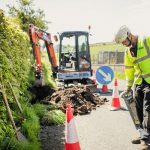Study – UK Mobile Coverage Will Improve, But Only if Land Owners Lose Out
A new Deloitte report, which was commissioned by the Mobile Operators Association, has claimed that up to £270m could be saved by updating the current Electronic Communications Code so that UK mobile operators can improve their network coverage without having to pay huge fees to install wireless masts on private land.
The predictable report stems from last year’s £5bn agreement between the Government and Mobile Network Operators (i.e. Three UK, O2, EE and Vodafone), which pledged to extend the geographic coverage of 2G (voice and text) networks from 80% today to 90% by 2017 (the target for 3G and 4G is 85%, up from 69% today).
Advertisement
But as a concession the MNO’s asked the Government to make it easier for them to invest in the installation of new masts and related cable infrastructure, which they believe can be achieved by either keeping the licence fees for radio spectrum low or effectively forcing land owners to cut their income through access rents.
Ofcom recently proposed a third revision to their controversial plans for an annual licence fee hike on the 900MHz and 1800MHz radio spectrum bands (here), although the adjustment was fairly small and unlikely to alleviate any MNO concerns. The regulator looks unlikely to shift on this and so the next target is land owners.
According to Deloitte’s report, mobile operators should be treated the same as water and energy companies when it comes to placing infrastructure on or under private land. The report claims that the industry pays, on average, £7500 pa in rent for sites in rural areas and £9200 pa in urban areas. By comparison, water and energy companies pay £270 and £280 pa for the same amount of land.
Apparently almost half of all MNO sites were also found to generate less revenue than they cost to maintain and, in this context, it is thus “difficult for operators to justify further network expansion to increasingly unprofitable locations“.
Advertisement
John Cooke, Executive Director of the MOA, said:
“The rental reductions from applying the water or energy regimes, as illustrated in the Deloitte report, to telecommunications providers would be sufficient to increase outdoor coverage to around 99% of the country. This would result in an economic benefit of up to £1.4 billion over ten years for those rural communities with limited or no coverage. Alternatively, the rental reductions could be used to invest in greater capacity, more innovative services or a combination of these.
If the Government were to move towards this type of payment model, it would need to do so with certain qualifications. One would be that network operators do not object to paying fair rents to Wholesale Infrastructure Providers (WIPs) to provide them with a reasonable rate of return on their investment in their infrastructure. The other qualification would be that for other sites, moving to a regime such as outlined in the Deloitte report probably could not happen overnight, but would need to be phased in over a transitional period.”
But changing the approach to rents requires a tedious review of the Electronic Communications Code (ECC), which after much stalling has finally been started (here). But private landowners are deeply unhappy with idea (here) and fear that imposing new regulation would weaken the control of their own land and reduce income, which may be especially damaging for rural farmers where money is already hard to find.
The new rules would however make it easier for operators to share infrastructure and introduce a new procedure for land owners to request the removal of related infrastructure from their property, which would be harder for operators to resist. A new procedure would also be introduced to help settle any disputes.
Ultimately we doubt that mobile operators will get everything they want and land owners, which have been so resistant to change, may have to bend a little too. At the end of the day you can’t call for better broadband and mobile connectivity in rural areas, while at the same time keep demanding large sums of money for a service that may effectively only cover a small community (economically difficult to sustain). On the other hand Deloitte’s report is far from impartial.
Mark is a professional technology writer, IT consultant and computer engineer from Dorset (England), he also founded ISPreview in 1999 and enjoys analysing the latest telecoms and broadband developments. Find me on X (Twitter), Mastodon, Facebook, BlueSky, Threads.net and Linkedin.
« Sky Go and Virgin TV Anywhere Slammed for Lack of Android 5 Support

















































Comments are closed